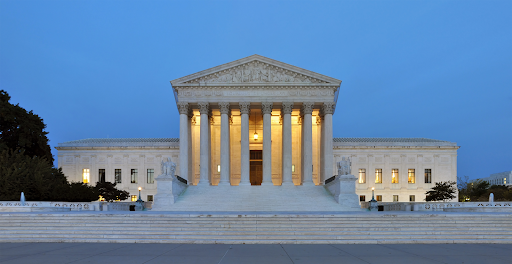
“Panorama of United States Supreme Court Building at Dusk,” CC BY/SA 3.0, Joe Ravi A number of colleges such as Harvard and the University of North Carolina at Chapel Hill (UNC) use affirmative action during admissions decisions. The Students for Fair Admission (SFFA) opposes this and brought its cases to the Supreme Court.
Affirmative action may be banned in college admissions
On Oct. 31, two cases were heard at the Supreme Court: one was between the Students for Fair Admission and the University of North Carolina at Chapel Hill (SFFA v. UNC), and the other was between SFFA and Harvard (SFFA v. Harvard). Both cases concerned the use of affirmative action during both universities’ admissions decisions.
“I do believe that [race] should be taken into consideration during admissions processes,” junior Mimi Mohammed said. “It’s a pretty extraordinary thing when colleges advocate for certain races or ethnicities than if [colleges] only looked at every student’s academics or extracurriculars.”
Affirmative action is defined as “the practice or policy of favoring individuals belonging to groups known to have been discriminated against previously.” Both SFFA v. UNC and SFFA v. Harvard will settle the issue of whether or not ethnicity or race can still be a factor during those two universities’ admissions decisions. Associate Justices Ketanji Brown Jackson and Elena Kagan, among others, support affirmative action in universities’ admissions decisions. According to the LA Times, Jackson believes that getting rid of affirmative action would be a “mistake and maybe discriminatory” and Kagan believes that affirmative action will help to diversify campuses.
“I support colleges maintaining student diversity through affirmative action,” junior Yao Li said. “But [a student’s qualifications are more important than their race].”
On the other hand, Chief Justice John G. Roberts, Jr. and Associate Judge Clarence Thomas, among others, oppose affirmative action because it allows one’s ethnicity or race to be a factor in admissions decisions. They believe that admissions policies should be “colorblind” and “race neutral,” which is seen in public universities in California, including the University of California system. The 1996 California Proposition 209 states that “[California] shall not discriminate against, or grant preferential treatment to, any individual or group on the basis of race, sex, color, ethnicity, or national origin in the operation of public employment, public education, or public contracting.”
“No, I do not support colleges’ use of affirmative action. If an applicant’s race is a factor in colleges’ admissions decisions, it can authorize unequal and discriminatory actions among colleges accepting students,” junior Angela Liu said. “Race is not equivalent to how much a student shows leadership, respect, kindness, and intelligence, rather it just shows their heritage and family background.”
So far, a total of nine states have banned race-based affirmative action: California (1996), Washington (1998), Florida (1999), Michigan (2006), Nebraska (2008), Arizona (2010), New Hampshire (2012), Oklahoma (2012), and Idaho (2020). A decision on SFFA v. UNC and SFFA v. Harvard is expected early next year.